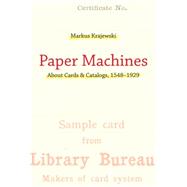
Note: Supplemental materials are not guaranteed with Rental or Used book purchases.
Purchase Benefits
What is included with this book?
| From Library Guides to the Bureaucratic Era: An Introduction | p. 1 |
| Temporary Indexing | p. 9 |
| Around 1800 | p. 25 |
| The First Card Index? | p. 27 |
| Addressing Ideas | p. 27 |
| Data Streams | p. 32 |
| Copy Error: The Josephinian Card Index | p. 34 |
| Floods | p. 35 |
| Canals | p. 37 |
| The Algorithm | p. 38 |
| Error: Buffer Overflow | p. 42 |
| Paper Flow: Taming, Duration | p. 43 |
| Revolution on Playing Cards | p. 45 |
| Thinking in Boxes | p. 49 |
| The Scholar's Machine | p. 50 |
| Genealogy: Johann Jacob Moser and Jean Paul | p. 53 |
| Elsewhere | p. 56 |
| Banknotes | p. 58 |
| Balance Sheet | p. 62 |
| In Praise of the Cross-Reference | p. 63 |
| On the Gradual Manufacturing of Thoughts in Storage | p. 65 |
| American Arrival | p. 69 |
| Do Not Disturb | p. 69 |
| Early Fruits and Dissemination | p. 78 |
| Around 1900 | p. 85 |
| Institutional Technology Transfer | p. 87 |
| Reformation: Dewey's Three Blessings for America | p. 87 |
| Transfer; Library Bureau | p. 90 |
| Library Supplies | p. 90 |
| Standardization | p. 91 |
| Corporate Genealogy | p. 92 |
| The Transfer | p. 95 |
| Product / System / Manufacturing | p. 100 |
| Digression: Foreign Laurels | p. 102 |
| Industry Strategy | p. 104 |
| Transatlantic Technology Transfer | p. 107 |
| Supplying Library Supplies | p. 108 |
| The Library Ge-stell | p. 108 |
| Punch Card | p. 110 |
| The Bridge Enters the Office: World Brain | p. 113 |
| Paper Slip Economy | p. 123 |
| System/Organization | p. 125 |
| Universal / Card / Machine | p. 127 |
| Invalidation | p. 131 |
| The War of the Cards: Copyrighting the "Card Index"™ | p. 133 |
| Depiction / Decision | p. 135 |
| Summary: Order / Cleanup | p. 139 |
| Afterword to the English Edition | p. 143 |
| Notes | p. 145 |
| References | p. 181 |
| Index | p. 207 |
| Table of Contents provided by Ingram. All Rights Reserved. |
The New copy of this book will include any supplemental materials advertised. Please check the title of the book to determine if it should include any access cards, study guides, lab manuals, CDs, etc.
The Used, Rental and eBook copies of this book are not guaranteed to include any supplemental materials. Typically, only the book itself is included. This is true even if the title states it includes any access cards, study guides, lab manuals, CDs, etc.